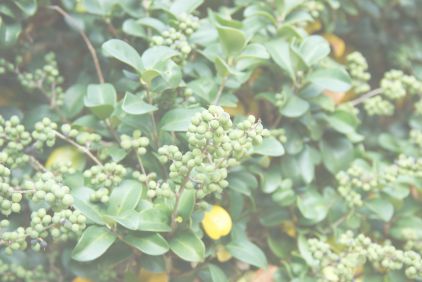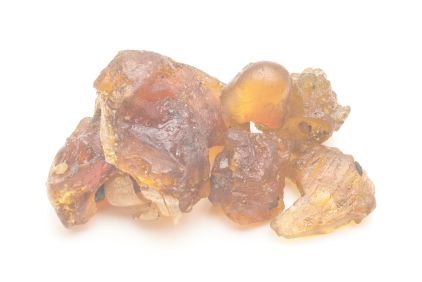Guggul to target bad cholesterol

The Guggul of its Sanskrit name Guggulu, literally "the one who protects against diseases" is a reference to target cholesterol. It also helps to maintain normal levels of serum lipids in the blood (hyperlipidemia). It is particularly effective in stabilizing Vata and Kata imbalances without irritating Pitta. Imbalances Vata imbalances manifest themselves in poor circulation, difficult digestion and elimination, and painful joints. An imbalance of the dosha Kapha leads to overweight and increased bad cholesterol.
Cholesterol is essential for the proper functioning of cells, muscles, neurons, heart, brain and digestion. Without it, no communication between cells is possible. It is the source of body temperature, sex hormones, stress hormones, reproductive hormones and vitamin D. What is measured in the analyses is not the cholesterol itself, but its transporters: LDL and HDL. LDL (" bad cholesterol ") carries cholesterol to the arteries and tissues, while HDL ("good cholesterol") carries cholesterol back to the liver to be broken down. Both have an essential function for the body, but when LDL stores too much cholesterol in the arteries, the arteries become clogged, posing a health risk, especially with cardiovascular problems.
Today, 7 million French people take a treatment against cholesterol. But what are the causes of an excess of bad cholesterol? A diet that is too fatty or too important, as well as a lack of physical exercise. The lipids then end up accumulating in the blood and clogging the arteries and tissues. The Guggul helps to prevent and reverse this process by stimulating digestion and eliminating lipids from the blood. Studies1 conducted in 2003 in the United States show that Guggul increases the production of thyroid hormone. This last one decomposes by combustion the cells of proteins, lipids and carbohydrates. This decomposition leads to a decrease in the level of bad cholesterol (LDL), triglycerides and insulin levels in the blood, and improves the HDL/LDL ratio. The effectiveness of Guggul can easily be seen by taking a blood test before and after a one-month treatment.
The Guggul, the thyroid and the overweight

What is the function of the thyroid?
The thyroid is an endocrine gland (which secretes hormones into the bloodstream) located in the front of the neck. It affects metabolism, energy expenditure, heat production, the nervous system, cell function, heart rate, blood pressure and sweating. When there is too much secretion of thyroid hormones, it is called hyperthyroidism, while too little secretion of hormones is called hypothyroidism. The guggulsterones support a good function of the thyroid, in particular by supporting the absorption of iodine, and help the body to regulate its metabolism naturally.
Know your metabolism
If you gain weight due to a slow metabolism, it is often accompanied by fatigue, dry skin and cold hands and feet. To get a small glimpse of your thyroid activity, you can perform the basal (resting) body temperature test developed by Dr. Barnes. This test cannot be done during times of infection or during menstruation for women as it will skew the results. When you wake up, do as little movement as possible and place a thermometer under your arm for 10 minutes. The values corresponding to a good thyroid activity are 36.6 to 36.8°C. If your temperature is lower it means that your metabolism and thyroid function are slow, which could explain weight gain.
The benefits of Guggul on overweight
Excess weight is an imbalance of the Kapha dosha, which has an impact on the thyroid, fat and elimination. In addition to its action on the thyroid gland, Guggul promotes the breakdown of fat and inhibits the formation of new fat cells. This Indian resin stimulates the digestive fire agni as well as the secretion of bile at the liver level. The regulation of the metabolism of fatty acids and bile secretions thus makes it possible to treat the problems of fat accumulation.
Elimination of cholesterol and toxins
In addition to fighting against bad cholesterol and overweight, Guggul helps to eliminate toxins and waste present in the body tissues, joints and blood. It is thus considered by the Indians as a"blood purifier".
Toxins and chemical residues (heavy metals, preservatives, pesticides) are liposoluble (they mix in fats). This is where Guggul intervenes to dissolve the bad fats. This particularity of Guggul is all the more important as the thyroid is the most sensitive organ to chemical residues. Toxins accumulated in the body hinder the natural regenerative functions of the body and lead to pathologies such as rheumatism, allergies, migraines, joint and muscle inflammations (arthritis, osteoarthritis) as well as digestive inflammations (colitis, irritations, constipation, hemorrhoids). Considered as one of the most important blood purifiers in Ayurveda, the Guggul softens the arteries, tones the heart, relieves circulatory problems and helps to get rid of residues. Its detoxifying action at the level of tissues would also help to have a more important bone density and thicker cartilages.
Botanical and Ayurvedic information
Guggul is the name of the resin of the Commiphora mukul tree, a myrrh tree. This resinous shrub with thorny branches, also called "Indian frankincense" grows in the arid areas of northern and southern India. It can reach a height of about 3 meters. The active substances of Guggul (guggulsterones) are extracted from the guggulon, the oleoresin that runs down the bark. In the original texts of Ayurveda, which date back more than 4500 years, it was already recommended to help clean the intestines, blood and tissues. Guggul has long been used as a remedy against overweight and hardening of the arteries. At that time, the Indians took it in the form of raw gum (dried resin) or purified. Nowadays, Guggul is still appreciated in India as it is part of many traditional preparations. The Guggul of Ayur-vana does not contain statins. It is titrated at 2.5% of guggulsterones (HPLC analysis method).
- Szapary PO, Studies of the influence of guggulipids in the treatment of hypercholesterolemia. JAMA. (2003)








